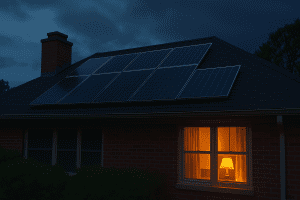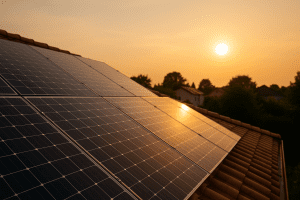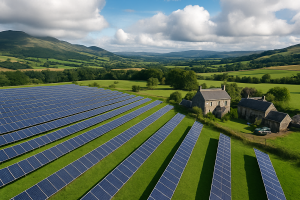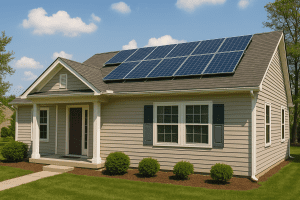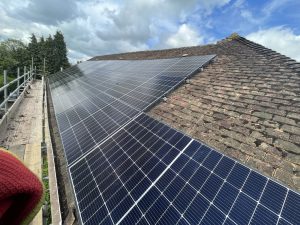Why Care Homes Are Going Solar in 2025: Key Insights from the Care Show London

Written By
- Manan Shah
Published on
- 02 May 2025
As the UK care sector faces rising energy costs and increasing environmental responsibility, many care homes are turning to solar energy as a sustainable solution. During the 2025 Care Show London, Rahi from Solar4Good, one of the UK’s leading residential and commercial solar providers, shared powerful insights into why solar is becoming an essential upgrade for care homes across the country.
In this blog, we’ll break down the key takeaways from that discussion, including the economic and environmental benefits of solar, battery storage debates, funding availability, and actionable advice for care home owners.
1. The Care Sector’s Growing Interest in Solar Energy
Care homes are increasingly under pressure to manage tight operating budgets while maintaining compliance with environmental goals. As Rahi shared, solar energy provides a dual benefit:- Lower energy bills
- Reduced carbon footprint
2. Typical Solar System Size for Care Homes
During the interview, Rahi explained that while every care home has unique energy needs, a 30 to 40-bedded facility typically requires a solar system between 30 kW to 50 kW. “Every care home is bespoke… but generally for a 30 to 40-bed care home, you’re looking at a 30-50 kW system.” Such systems can power:- Air conditioning
- Lighting and fans
- Kitchen equipment
- Laundry machines
3. Seasonal Performance and Annual Savings
One common concern is whether solar panels are effective year-round in the UK. Rahi clarified this:- Monocrystalline panels work on daylight, not heat, so generation continues even in winter.
- During summer months, care homes can be 80-90% self-sufficient.
- Over a yearly cycle, most clients see 40-60% savings on electricity bills.
4. Do Care Homes Need Battery Storage?
The conversation touched on one of the most debated questions in solar today: is battery storage necessary for care homes? Rahi’s answer: It depends.Pros of Battery Storage:
- Stores excess solar energy for evening use.
- Can be filled using off-peak electricity and used during expensive hours.
- Useful for care homes with higher night-time energy needs.
Cons:
- Adds to upfront cost.
- Not always needed if most energy is used during the day.
5. Smart Tariffs: A Hidden Opportunity
The conversation also explored the value of smart electricity tariffs. The host shared their personal experience saving 23% on energy bills by using a smart tariff that charged less during non-business hours. Care homes can apply similar logic:- Use solar during the day
- Charge batteries at night using low-rate electricity
- Reduce reliance on peak-time energy
6. Surge in Demand Across the Healthcare Sector
Solar4Good isn’t just seeing interest from care homes. According to Rahi: “We’re seeing inquiries from medical centres, pharmacies, and other healthcare facilities. They’re fed up with rising electricity bills.” This shift is part of a broader trend where healthcare providers are actively seeking ways to become more energy-independent and future-ready. The consistent rise in utility prices has turned solar from a “green” luxury into a financial necessity.7. Funding and Grants: What’s Available?
While government support is more limited than in the past, some local councils and associations still offer funding for green upgrades. “There is funding about – it depends on the area and local authorities.” Care home owners should:- Check with local councils
- Explore Low Carbon Skills Fund (LCSF) or Salix Finance
- Investigate green commercial loans
8. Energy Audits: A Smart First Step
Rahi offered a practical piece of advice for all care home owners: “Look into your energy bills. Get an energy audit. You’ll be surprised how much you can save.” An energy audit can:- Highlight inefficiencies
- Determine optimal solar system size
- Uncover quick wins before investing in panels
9. Return on Investment: How Fast Can You Break Even?
One of the most compelling points was the ROI figures mentioned. In many cases, solar installations in care homes pay for themselves in 3 to 4 years. In some cases? “I heard of a care home that broke even in just 2 years.” This kind of payback period makes solar one of the most strategic investments for care homes in 2025.10. Final Thoughts: Why 2025 Is the Time to Act
If you’re a care home owner or operator, 2025 is a critical window of opportunity to explore solar. Why now?- Energy costs are surging
- Sustainability is no longer optional
- Technology has matured and offers higher efficiency
- Public funding, while limited, is still available
- Patients and families are increasingly aware of green practices
Take Action
Thinking about solar for your care home? Here’s your next step:- Schedule an energy audit
- Request a quote from Solar4Good or your preferred installer
- Explore your funding options

